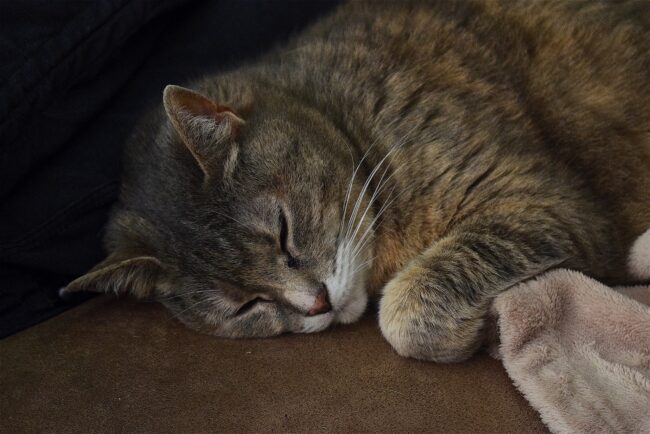Table of Contents
Vomiting is quite common in cats and is not generally considered a problem. However, some medical conditions can lead a cat to vomit and it should receive attention. If your cat vomit looks like poop, it could indicate an underlying issue. But what does it exactly mean? In this post, we discuss this problem including its causes, treatment and prevention.
This information should help you understand what is normal and when you should take your cat to a veterinarian.
Cat Vomit Looks Like Poop?
Talking about vomiting, cats and humans are quite similar. When the stomach detects some indigestible material or something that causes irritation, it throws it out. Cats being sensitive creatures, there is so much that could lead them to vomit anywhere all of a sudden. The most common reasons are often hairballs that a cat could ingest while grooming. Another possible reason could be an allergy or intolerance to certain foods or drinks.
However, when the cat vomits like poop, it can alarm the owners. It is important to understand that stools are the solid or semi-solid remains of foods that could not be broken down further in the intestine. If these partially digested foods are thrown out for some reason, the cat vomit looks like poop. This means your cat’s stomach is facing some issues like gastroenteritis though it is difficult to identify the exact cause by yourself.
Diagnosing the underlying condition of a vomiting cat requires professional assistance so it is recommended that you consult a vet at the earliest. This will help you determine the current situation of your cat and the treatments it should receive. You should avoid giving it any unprescribed medicines as they will only treat the symptoms and not the health condition it is suffering from.
Why Does Cat Throw Up Look Like Poop?
Cats vomit more easily than other animals and often do it at their own will without any reason. The most common cause of vomiting in cats is the ingestion of hairballs or some other foreign object that could irritate the stomach. Intestinal parasites could also cause stomach irritation and result in vomiting. When any of these causes block the intestines and create inflammation, your cat can show signs of nausea and vomiting.
If your cat has food sensitivities, it throws up undigested or partially digested foods that look like poop. When your veterinarian has identified sensitivity as the cause of vomiting, you may have to try a sensitive food diet with your cat to improve the condition. If it does not work, the vet may recommend a hydrolyzed protein diet for it. These foods go through a process that breaks down the protein into components so that the cat’s system doesn’t identify the food as an allergen and there are no symptoms of allergy like vomiting.
Another cause of vomiting in cats is overeating or eating too fast. Gobbling a lot of food and exercising soon after eating can induce vomiting in cats. Such throwing up is not serious if it does not happen too often. You can try separating bowls for individual kittens to avoid rapid eating. Food puzzles are also great ways to slow down the eating time and avoid vomiting. Your vet can better advise on the exact cause and treatment method.
Cat Throwing Up Clear Liquid – Here’s What To Do
If your cat throws up clear liquid, it is the ‘gastric juice’ coming out from the intestinal tract. While vomiting itself is not a symptom of a disease, it could be associated with a variety of problems. Some of the most common causes of throwing up clear liquid are hairballs, pancreatitis, constipation, quick eating, stress, anxiety, parasitic infections and internal obstructions. The first thing you should do is to pay attention to the cat’s behaviour to see if vomiting increases and the way it reacts.
Vomiting clear liquid before a hairball is quite common. Make sure you follow a regular brushing schedule to get the cat rid of any loose fur it can ingest while grooming. A change in the cat’s diet can also cause throwing up clear liquid. Ensure that you introduce any changes to the diet gradually to avoid such issues. If the cat skips a meal or is not fed on time, the stomach juices collect and cause the cat to vomit.
Frequent vomiting is never normal for a cat. If your cat vomits clear liquid several times in a week along with other symptoms like lethargy, lost appetite, diarrhea or weight loss, you should book an appointment with the vet immediately. The vet will examine the cat physically to identify what is wrong with it. He can also ask for several tests to check the cat’s organ functions and blood composition. Based on the diagnosis, the cat will be prescribed oral medications or therapy. In serious cases of internal blockages, the cat may have to go through surgery.
Elderly Cat Vomiting Undigested Food
An elderly cat vomiting means a lot of things because age brings considerable changes in the body of the feline. A senior cat is also likely to suffer from diseases not seen in young kittens. While it is possible that the elderly cat is vomiting from a food allergy, eating too fast or hairballs, chronic illnesses are more responsible and a vet should help you find the exact cause. If your cat vomits frequently or daily, it should be a symptom of a serious illness that you should treat in the first place.
One of the most common reasons elderly cats throw up is an intestine problem like cancer or chronic inflammation. Frequent vomiting can also be a symptom of hyperthyroidism along with other signs like diarrhea, weight loss and lethargy. The vet can diagnose this condition with a blood test and recommend the necessary treatment. Frequent vomiting in a senior cat can also suggest a kidney failure. This problem is quite common in old cats and often the reason for their death.
Some lesser likely causes of vomiting in elderly cats include viruses, parasites and foreign objects. It is best to consult your vet and describe the condition. Keep a record and tell the doctor how frequently the cat vomits. Ignoring the problem can make it worse. So, if your senior cat vomits often, take it seriously and take it to the vet at the earliest.

